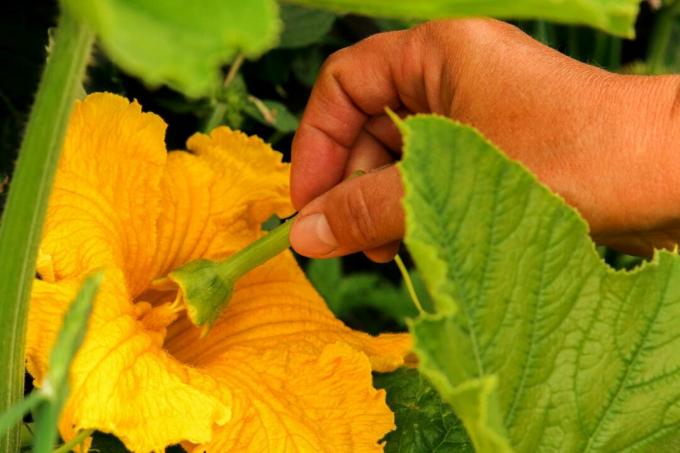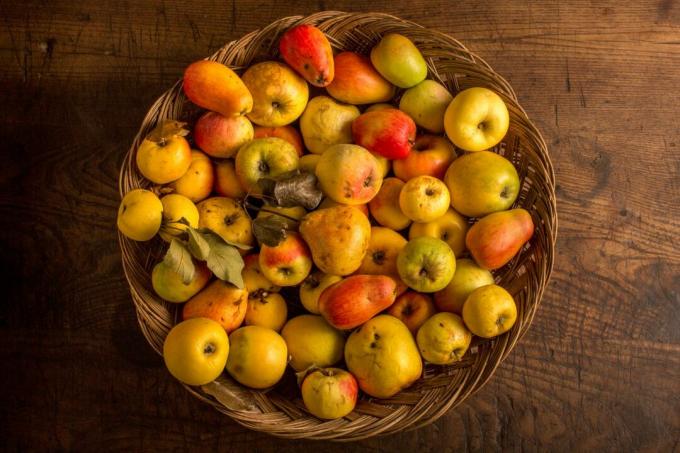Seed resistant varieties are increasingly being offered as a more natural alternative to hybrid seeds. But what actually is firm seed and how do you recognize it?

Growing crops yourself and later also harvesting seeds is very much in vogue. The terms fixed seed or varietal seed appear again and again. But what exactly does "seed" actually mean and what are the advantages and disadvantages of seeded varieties? We get to the bottom of the term and explain the differences to hybrid seed.
contents
- What is firm seed?
- What are the advantages of open-pollinated seeds?
- How can you identify open seed?
- Are solid seeds always organic?
What is firm seed?
Fixed seed or varietal seed refers to plants that can be further propagated with a stable varietal profile. The offspring from the seeds obtained show similar to the same characteristics and the same external shape as the mother plant. In addition, they are always able to form self-fertile seeds.
Varietal seed occurs naturally in predominantly or exclusively self-pollinating species such as tomato (Solanum lycopersicum), Bean (Phaseolus vulgaris) or pea (Pisum sativum). Manual pollination also makes it possible to breed non-seed cross-pollinator varieties such as the pumpkin family (Cucurbitaceae).

In contrast, there are hybrid varieties that result from a single, targeted crossing with two inbred lines, i.e. homozygous parents. All offspring of this cross are genetically identical and therefore all have exactly the same characteristics. This gives you a consistent crop with exactly the same flowering time, predictable yields, and disease resistance or tolerance. more on the subject hybrid seed and find out what it means for garden centers and farmers in our special article.
In breeding, a distinction is not only made between hybrid varieties and open-pollinated varieties - there are also so-called open-pollinated varieties. They are sometimes referred to as landraces and, in a broader sense, are among the open-pollinated varieties. Here, not a specific variety line is improved and propagated by breeding. Instead, seeds are obtained from multiple mother plants with the desired traits, which are allowed to interbreed wildly. They all possess a specific gene pool and are therefore referred to as a "variety", but come in significantly more inconsistent in appearance compared to genetically identical hybrid plants hence. Nevertheless, one can speak of a variety here because recognizable and distinguishable characteristics from other varieties are present. Open-pollinated varieties typically occur in cross-pollinated species such as rye (Secale cereale) or at cabbages (Brassica) for which manual pollination would be very laborious.

What are the advantages of open-pollinated seeds?
Seed-solid varieties are particularly good for the wallet and the preservation of genetic diversity. The varieties only have to be bought once, then you can get your own seeds and pass it on to friends and acquaintances. In comparison, hybrids are not only significantly more expensive to buy, they also have to be bought again and again. Hybrids only have a specific set of genes. They are genetically impoverished, so to speak, because diversity was inbred out of them through inbreeding of parent lines. They have been optimized for a few very specific properties - so they are sometimes in evolutionary dead ends if, for example, the climate changes.

Seed-solid varieties, on the other hand, preserve diversity, also by retaining “undesirable traits” that however, in certain situations, in the case of pathogens or weather conditions, an advantage Offer. An example of this are tomato varieties such as 'Fuzzy Wuzzy' or 'White Peach', whose leaves, stems and fruits are downy hairy. The hairs reduce evaporation of water, making them more drought-tolerant strains. Numerous insects also avoid hairy leaves - they are less likely to be eaten or attacked by aphids.
Among the open-pollinated varieties there are also so-called local varieties that have been cultivated in a specific area for many years and have become established in this area Time ideally adapted to the prevailing conditions, such as the potato variety 'Bamberger Hörnchen' or numerous varieties of orchards.
The advantages of firm seed at a glance:
- The variety can be propagated by seeds
- Conservation of genetic resources and diversity of varieties
- Preservation of historical and culturally significant varieties
- Local varieties: Ideally adapted to certain climatic and soil conditions
- No annual repurchase required
- Passing on a favorite strain to friends
In our Plantura seed sets contains only solid organic seeds. Depending on the set, different varieties or types are included for the balcony, vegetable garden or herb bed. You can reproduce all of the included varieties yourself and enjoy the colorful diversity of varieties every year.
Does firm seed also have disadvantages? Fixed seed has many advantages, but there are some disadvantages compared to hybrid seed. For example, varieties that are firm to seeds often have a lower yield, are more susceptible to disease or ripen unevenly. These properties are particularly important for farmers and nurseries who make a living from growing the crops.
How can you identify open seed?
When buying seeds, it is quite easy to identify seeds that are open-pollinated, since by law all hybrid varieties must have the suffix "F1" in the variety name. All varieties without this addition are seed-proof. Local varieties, some of which have been cultivated in a specific region or by families for centuries, are also open seed. Hobby propagators are dedicated to preserving and passing on these partly completely forgotten varieties and offer them for exchange or purchase at seed festivals.

Historical species that have been replaced in commercial horticulture by higher-yielding, more robust and easier-to-cultivate varieties also count as open-root crops. Even wild plants or very rare, almost forgotten cultures are seed-solid, since they are not processed in a laborious breeding process. So will also chervil beet (Chaerophyllum bulbosum) or oat root (Tragopogon porrifolius) offered as firm vegetable seeds.
Examples of historical, solid tomatoes are ‘Bern rose‘, ‘Silesian raspberry' or 'Golden Queen‘. Many new varieties from organic, especially biodynamic breeding, are varietal thanks to the concept of recycling and can be propagated via seeds with the right technology.
On the other hand, there is no way to tell from the plant or the seed itself whether it is a seed-resistant variety or not. It becomes noticeable when self-seeds of a hybrid variety are sown the following year. The offspring receive a motley set of parental genes and therefore grow inconsistently because each seed has an individual genome. They can vary greatly in vigour, flowering time, fruit shape, size and color as well as taste.

Are solid seeds always organic?
Solid seed does not automatically mean that it is also organic seed. The addition "organic" refers to the cultivation form of the mother plants from which the seed was obtained. With many organic breeders, however, it is now common for seed-resistant varieties to be cultivated, further processed and propagated. In the case of biodynamic seed, varietal stability is even mandatory. You want Buy organic seeds and multiply without hesitation? In our Plantura seed sets Of course, we only use premium-quality organic seeds - you have the choice between compact varieties for the balcony and high-yielding garden vegetables.
How exactly Organic Seeds is cultivated and what the differences to conventional seed are, you can find out in our special article.
...and receive concentrated plant knowledge and inspiration directly in your e-mail inbox every Sunday!
